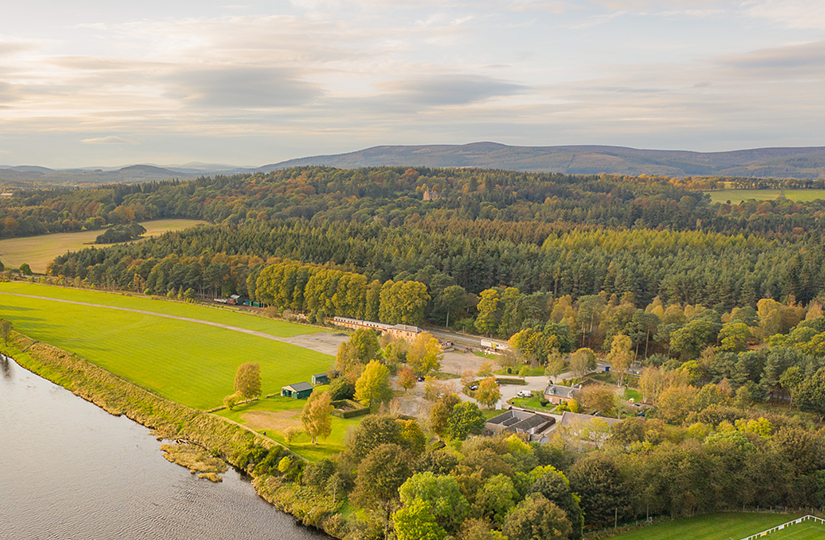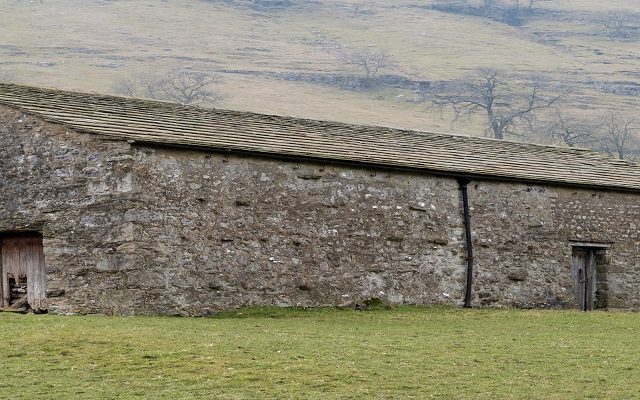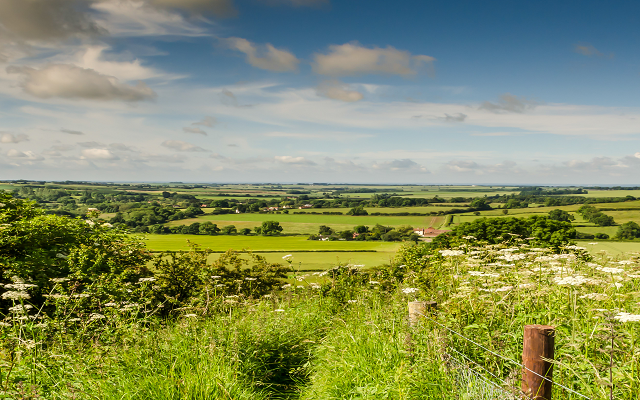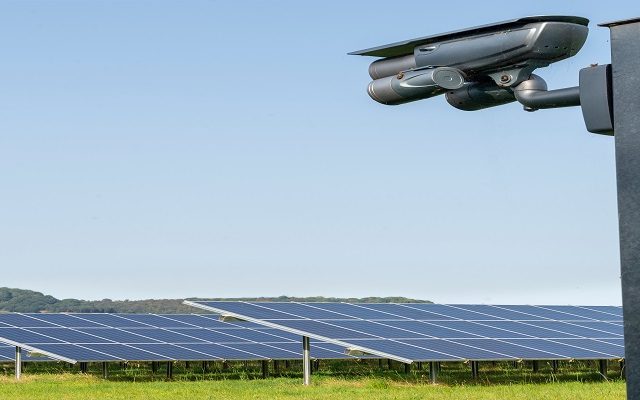Businesses we admire: Leys Estate
The creation of pathways connecting the different facets of the business at Leys Estate in Aberdeenshire is symbolic.
It reflects a wider mindset that the main elements of the business – the traditional rural estate, the commercial and retail lets, biomass energy scheme, sports ground leases, land and housing development – should not be viewed as separate entities but part of a shared legacy. The estate is the home of the Burnett family and has been within their ownership since 1323.
Strutt & Parker consultant and Leys Estate Group CEO David Smart has helped steer the ship for the past 20 years, helping to shape Leys into the modern estate it has become. It’s a role that started with two days a week in tandem with other managed clients and evolved into a secondment in 2016 that is now ‘effectively full time’.
There’s salmon fishing, shooting and stalking – everything you would expect from a great Scottish estate – but the scale of non-traditional enterprises is awe-inspiring.
Leys Estate Group also has a link to the Burnett family’s housebuilding and construction arm, the Bancon Group. When the buyers or tenants of these properties turn the heating on, it’s the estate’s Hill of Banchory Biomass Energy Centre (HoBESCo) that provides the heat from woodchip. ‘Over at the rugby club, when the lads have a shower the water is heated by a biomass scheme,’ explains David. ‘It’s the same over at the new council- run swimming pool.’
Then, of course, there is the hope that the new home residents will support the myriad of businesses that are renting premises from the estate and they may even end up working or renting one of the estate’s many office units. Throw into the mix the new £8.4m sports centre, funded by the council but on land leased for 175 years from the estate for a nominal £100 a year, a renowned theatre and arts centre, ground earmarked for a new academy, rugby and football pitches, athletics ground, nine-hole golf course and driving range and the sheer scale of the enterprise and the support to community projects starts to become clear.
‘There is no getting away from the old adage location, location, location,’ David muses. ‘We’re only 20 miles from Aberdeen, yet here we are in Royal Deeside in the most stunning of rural settings, so the estate is blessed with the most ideal location.’
Proactive approach to communication
The size of the estate’s business does throw up challenges, such as retaining a sense of place and it’s become impossible to rely on word-of-mouth for the local community to know what’s going on.
‘We now have a communications and marketing manager and a strategy agreed at board level,’ says David. ‘The more we do, the more important it is to inform people. I get asked to speak to so many local groups and it’s always the same story: “Oh, I didn’t realise the estate does that”. There is always something they find fascinating, but yet didn’t realise was an estate initiative.’
This new proactive approach to communication is already paying off. A good example was when the estate carried out a voluntary consultation for a new road near a housing development and there were around 700 objections.
‘Having listened to the community, we re-planned the road with the council and when we re-consulted there was just one letter of complaint,’ says David. Similarly, there has long been a proposal for a new secondary school on zoned land in the local plan.
‘The longer the school wasn’t being built, the more people were thinking that the estate wasn’t delivering the land,’ explains David. ‘So we have actively been communicating with parent teacher groups, local councillors and at other meetings to explain that the land is available – the problem is that the council doesn’t have the budget to develop it. It’s a new approach and it really works as people begin to understand and say: “I didn’t realise that!”.’
Engaging the next generation
It’s a strategy that has filtered all the way down to grass roots, with a deliberate effort to engage with the next generation.
‘We explain all about the estate to as many youngsters as we can, from cubs, brownies, scouts and guides and also local schools.’
With young people so environmentally aware, the estate’s various biomass schemes, which have been operating since 2012, never fails to get them talking. The estate has one of the largest privately owned renewable district heating networks in Scotland. The wood chip is produced from estate-grown timber, purchased small roundwood sawmill co-product, plus there are 30 hectares of short rotation coppice willow grown and harvested on a three-year rotation.
In another example of its upfront attitude, the estate has urged any estate residents or businesses struggling to pay their energy bills or rent due to the COVID-19 pandemic to get in touch and communicate their problems. ‘Far better to know early if people are struggling and we can try and work with them to find an appropriate solution,’ says David.
It’s the office units where David and his team are having to be especially creative since the onset of the COVID-19 virus; they are open to flexible rental models and are offering a ‘plug and play’ office rental model.
‘People will not want to rent long-term office space going forward,’ says David. ‘Post-COVID we’re much more likely to be doing business with somebody wanting to rent an office and occupy it for two days a week or parts of a week. Working from home during the pandemic has made some bigger businesses realise that a satellite hub on a rural business park such as ours is a very real possibility. A team might need to get together for a few days of the week, but the days of employees needing to commute into a head office every day are starting to look outdated and we have a new legal firm tenant moving in to our Business Centre on exactly that basis.’
Focus on the skill set
Interestingly, David views the Leys Estate Group as a ‘land and property business’ so it has a deliberate policy to stick with what they are good at and not to try and run multiple diversified businesses.
‘Land and property business is our skill set,’ he says. ‘You see so many estates opening the farmshop, the brewery and so-on which can be good diversifications. However, we’re very happy to facilitate these types of businesses, but would far rather have tenants that are passionate and knowledgeable about running these specialist businesses than try and manage them ourselves and it de-risks it for us.
‘We’re a bit like a property dating agency. We’re the ones with the land and property and then we get together with those with specialist expertise and passion. We then find a way to work together to make the new relationship work and it is having an open and flexible approach to this that is the key.’
Supporting tenants
One such dalliance that has turned into a long-term love affair with the estate is a company called Aberdeenshire Highland Beef. Its owner Grace Noble built up her herd and offers successful tours of the farm and her Highland cattle and has a butchery and small farmshop direct-selling her amazing beef products. She is also hoping to develop the farmshop, create a café and have more educational farm tours, but like many businesses the pandemic has delayed her progress on this.
‘The estate has the perfect fit with my own vision and hopes for the future and is keen to collaborate with other businesses,’ she says. ‘It’s giving businesses the opportunity to grow and enhance the estate, at the same time as having an impact on the local economy.’
Meanwhile, when the estate’s ghillie recently retired, twin brothers William and Alastair Peake, who had become known to Leys Estate initially via renting a retail unit for their fishing tackle and fish guiding activities, took a lease of the estate’s prime salmon fishing beat and are developing Scotland’s first ‘on-river’ fly fishing school and guiding business.
There are 17 farms on the estate, with only one farmed in-hand. Out of the 16 rented holdings, David is proud that two of them are run by female tenants. ‘Two out of 16 may not sound many to some people; but those who know agriculture will realise it is an encouraging proportion.’
Another area of personal satisfaction for David is that 12 of the tenanted holdings already have their succession plans in place from within their own families. The estate also recently gave two new young farm tenants the opportunity to take up new tenancies when 325ha (800 acres) of the estate came up for re-let. 565ha (1,400 acres) of the estate is forestry and woodlands with the remainder traditional mixed farming of livestock and arable.
With two small wind turbines, the biomass schemes and PV arrays on some buildings, the estate is very environmentally aware. Add into the mix that its owner Alexander Burnett is Conservative Member of the Scottish Parliament (MSP) for Aberdeenshire West, with special interest as deputy convener of the Cross-Party Group on Renewable Energy and Energy Efficiency, and it’s no surprise to learn that they are reviewing their carbon audit of the estate, plans are afoot for a natural capital audit and there is a focus on regenerative agriculture and forestry.
Revised forestry strategy
There has been some recent rethinking with regard to the forestry enterprise, away from felling and then costly replanting to more sustainable silviculture.
David explains: ‘In line with our Forest Management Plan, over the past five years we have changed from rotational thinning, clearfell then replant, to rotational thinning with a view to a less commercial policy of natural regeneration and supplementary planting without expensive fencing. It requires a well-managed deer control policy to make this work. There is a massive saving on fencing costs and there’s less of an eyesore with smaller thinnings and less clearfell, a more varied woodland in the future and no rusty old fences around semi-mature plantations.’
Another interesting initiative is offering small managed forestry compartments – known as woodlots – on five- or ten-year leases to allow individuals to manage them for firewood gathering and recreation.
Sustainable housing
The Leys Estate Group is also embarking on an exciting new sustainable housing development at ‘Woodend at Crathes’ on the edge of Banchory.
There are plans for 24 private new homes and eight affordable homes to be built and sold on a plot trader-build contract model in partnership with a local house building company, and also to relocate the local athletics track and club to better facilities at Woodend at Crathes. The new homes, named Woodend Sustainable Housing, will be like no other in the area and will be of contemporary design and built to gold standard in terms of sustainability.
Adapting to changing times
According to Alexander Burnett, the 9th laird of Leys, who lives on the estate with his wife Lavinia and their three young children, the COVID pandemic has forced the team to adapt – but that is something they have always done.
‘Rural communities have pulled together and people appreciate the outdoors and their quality of life much more – which should give rise to optimism for estates willing to modernise.
‘The diversity of the estate can in itself be quite daunting and taking time to plan and focus on priorities is time well spent, even if sticking to those priorities can then be a challenge in itself,’ he adds.
‘We’ve done a huge range of projects but my proudest would definitely have to be building a set of pitches for Deeside Rugby and seeing that first mini-rugby festival with over 300 young players from all over the North-East of Scotland.’
This article is part of a wider Land Business Insights publication on The Future of the Estate, which includes a section on the role of rural placemaking in farm and estate diversification. Navigating the changes that lie ahead for rural estates will require innovative thinking and a proactive approach. The team at Strutt & Parker is here to help you on that journey, working alongside you to evaluate your options and turn plans into action. Please do get in touch if you would like to talk about any of the report’s contents.






